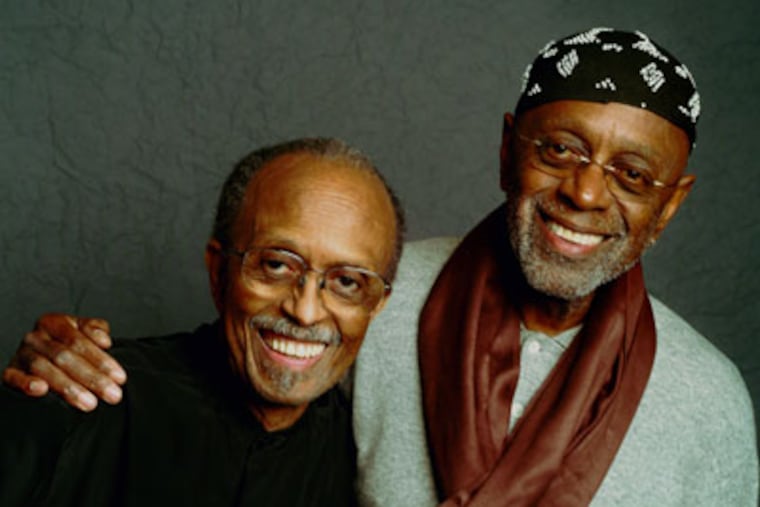Jimmy Heath, influential Philadelphia sax player and jazz giant, has died at 93
As a 13-year-old in South Philly, Heath got his first sax. “I said, ‘This is for me,’” he once recalled. “And I’ve been with the saxophone ever since.”

Jimmy Heath, the influential Philadelphia jazz saxophone player, composer, and bandleader who played with John Coltrane and Miles Davis and whose prolific career spanned seven decades, died Sunday at age 93.
Heath died in Loganville, Ga., of natural causes, according to his grandson, Fa Mtume. He was surrounded by his family, including his wife, Mona, whom he met in 1959 at a party celebrating his release from prison; his jazz and R&B musician son, James Mtume; and his brother, drummer Albert “Tootie” Heath, with whom he performed in the Heath Brothers along with the late bassist Percy Heath.
When Jimmy Heath’s autobiography was published by Temple University Press in 2010, he called it I Walked With Giants — a title with a double meaning. In his long and storied career, he collaborated with such jazz greats as Dizzy Gillespie, Clifford Brown, and Gil Evans.
But Heath was also small in physical stature, standing just 5-foot-3. He told NPR in 2017 that when he was growing up in South Philadelphia — first on Gerritt Street, then on Federal Street — he was too small to be an athlete. “I got on a horse once, and I got frightened when he started galloping, so I couldn’t be a jockey, either.”
His musical education came from the Louis Armstrong, Fats Waller, and Marian Anderson records that his father, Percy, an auto mechanic who also played the clarinet, and his mother, Arlethia, who sang in a church choir, played on a windup Victrola. At 13, he got his first sax. “I said, ‘This is for me,’” Heath recalled. “And I’ve been with the saxophone ever since.”
Heath wasn’t drafted into World War II because he was under the minimum weight. He toured with the Nate Towles Band and in 1946 formed his own group, including fellow sax players Benny Golson and Coltrane.
In those years, Heath was often called “Lil Bird,” a reference to both his stature and his ability to play in a high-speed style similar to bebop sax player Charlie Parker. In 1949, Heath broke up the group to join Gillespie’s band.
Like many of his peers, Heath was a heroin user in the 1950s. In I Walked With Giants, he recalled helping to revive Coltrane after his fellow sax man slumped to the floor at a Los Angeles gig. “If we hadn’t,” Heath wrote, “the Coltrane that people know would never have existed.”
Starting in 1955, Heath served 4 1/2 years in the penitentiary at Lewisburg, Pa., for selling drugs. He made good use of his time there — kicking his addiction, learning to play the flute, and focusing on composing and arranging. Playboys, a 1956 album by Art Pepper and Chet Baker, contained five songs Heath wrote in prison.
He released his first album as a leader, The Thumper, in 1959. He briefly played with Miles Davis, who had recorded his song “CTA” in 1953, but his probation kept him from touring. (Davis once called Heath “one of the thoroughbreds" of jazz.)
Heath followed The Thumper with five more LPs for Riverside Records and worked as an arranger for the label. Producer Orrin Keepnews helped him get a cabaret card so he could perform in New York clubs, a license often denied ex-convicts, and he settled in Queens with his wife.
The sax player arranged for both small combos and larger ensembles, such as 2006′s stellar big band album Turn Up The Heath.
“They are both desirable to me,” he told the Inquirer in 2009. “The big band is our symphony orchestra."
In 1976, he formed the Heath Brothers with Tootie and Percy — the latter a longtime member of the Modern Jazz Quartet — and the pianist Stanley Cowell. That year, his long-form The Afro-American Suite of Evolution premiered in New York. The Heath Brothers 1980 album Live at the Public Theater was nominated for a Grammy.
Starting in 1986, he taught for 11 years at Queens College in New York.
In 2013, Heath, whose frequently recorded songs include “Gingerbread Boy” and “Gemini,” spoke to NPR about the importance of writing. “You know, you got to compose. I want to be someone who can compose and leave something here for posterity.”
Heath released his last album, Togetherness, in 2014. In 2016, just before his 90th birthday, he was honored with a Jazz at Lincoln Center program called “Life of a Legend.”
“I loved his consistency,” said Bob Perkins, longtime jazz deejay on Temple University radio station WRTI-FM (90.1), who grew up on the same Gerritt Street block as the Heaths. “The whole family was miraculous. You had three kids in that family making a hell of a lot of noise.”
Perkins played Heath’s “Big P,” a tribute to Percy, after hearing the news Sunday. “Oh Lord,” he said, contemplating the loss. “Jimmy was a great technician, a composer, an arranger, an educator. He was perpetually going on. He did not let time stop him."
Heath is survived by his wife, daughter Roslyn, son James, brother Albert, and seven grandchildren and great-grandchildren.